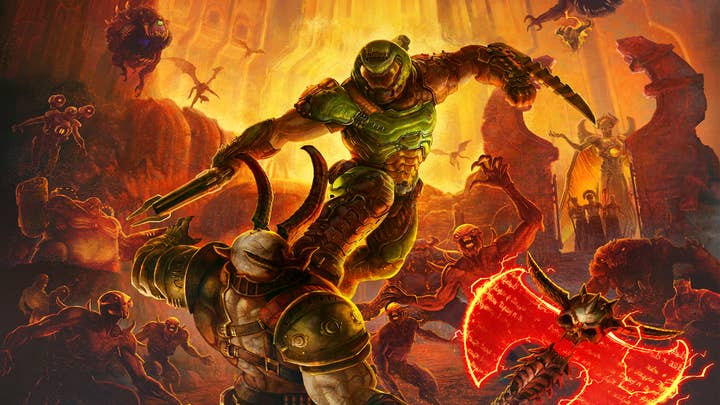Industry attitudes to outsourcing and contracting need to change | Opinion
Two high-profile composers reveal the breakdown of their relationships with studios – a symptom of a broader problem in how creative outsourcing is used across the industry
Usually, when we say the "stars have aligned" in some way, it implies that something positive has happened – but this week we saw a rather unpleasant alignment of stars, with two of the industry's best-known composers both ending up in the news after a seemingly irreparable breakdown in their relationships with the high-profile studios whose games they had been working on.
Sarah Schachner and Mick Gordon are two of the most talented and respected composers working on games today, each of them with an impressive portfolio of work on major franchises, and a fanbase in their own right. It's largely a coincidence that both of their struggles with their client studios are in the news this week – but that this is happening at all speaks to a long-standing problem with how many games companies deal with contractors and outsourcing partners.
Schachner took to social media to make official statement about her relationship with Activision Blizzard, for whom she scored Modern Warfare 2, which she claims has deteriorated to the point where she and other creatives collaborating on the music (including legendary hip-hop producer Mike Dean) are no longer involved with the game's soundtrack and have disowned the work being done on it as "not my artistic intent in regards to mixing and mastering."
The outsourcing model has been abused by many companies
Gordon, meanwhile, released a long and detailed statement about the long-running and contentious saga of the Doom Eternal soundtrack album, the poor quality of which Id Software very publicly blamed him for. His response, seemingly born from exasperation with Zenimax and parent company Microsoft's handling of the situation, documents a catastrophic relationship breakdown and, if supported by evidence as he claims, demonstrates both a breach of his contract, and a subsequent attempt to defame him and damage his career in order to shift blame for the situation onto him.
Outsourcing creative work – either to dedicated outsourcing companies, often located in developing countries, or to individual creators with highly specialised skillsets – has become a fact of life across the industry in the past two decades. That has come with both benefits and downsides. It has given an enormous degree of flexibility to game development – when properly managed, outsourcing can allow studios to effectively tackle projects far larger than their own resources would permit, building out a dynamic network of outsourcing partners and contractors who contribute to many different aspects of game creation.
On the other hand, the outsourcing model has been abused by many companies. Some have used the availability of outsourcing companies as an excuse to dramatically downsize their own headcount, or have tried to outsource aspects of the development that really need to be treated as a core internal competency.
These are strategies commonly pursued by people with MBAs on their office walls who have never actually worked in any development role in their lives, and unsurprisingly they usually backfire terribly as soon as anything difficulty arises with the schedule or development process, at which point attempts are often made to shift the blame onto the contractors and wiggle out of paying them in full.
The ubiquity of outsourcing, both for good and for ill, has given some people in the development sector a troubling sense of disposability
Alongside this, there is also a legitimate concern over the work conditions of outsourcing companies, especially in the developing world – although it bears repeating that the industry still hasn't exactly managed to get its ducks in a row about work conditions for its own staff down the corridor, let alone for third-party contractors halfway around the world.
The ubiquity of outsourcing, both for good and for ill, has given some people in the development sector a troubling sense of disposability. Lots of people in decision making positions within the industry tend to view outsourcing as being essentially plug-and-play; any given company or contractor can be replaced with one with similar competencies, and everything will be fine, right?
This assumption is used to justify paring costs and margins down to the bone, pushing outsourcers to compete on price rather than skill – leading to a situation where many people wrongly think of outsourcing as a way to cut the unit costs of developing assets and content. It's not, and never should be.
When outsourcing and contracting models are working as expected, they are inherently more expensive than doing work in-house, a fact that holds true across pretty much every industry where it happens. The benefit of outsourcing isn't found in unit cost, but rather in flexibility. An outsourcing contractor comes in to create an asset or do a piece of work, and they charge you far more than you'd have paid a full-time staff member to do the same job – but when that's done, they move on to creating assets or doing work for other companies, and you're no longer paying them until you need them again.
The flexibility you gain from outsourcing can save on a studio's overall burn rate, since you don't end up having staff sitting around with nothing to do for long periods – but in terms of direct costs for the assets created or work done, outsourcing is and should be inherently more expensive. Anyone approaching outsourcing and contracting expecting that they can farm out a busy full-time job and save money by doing so is frankly deluded, and probably about to do a whole lot of damage to the project they're working on.

The specific details of the conflicts between Activision and Schachner, and Zenimax and Gordon, aren't fully available to us, of course. Schachner has given only a broad statement, while there is a lot of he-said, she-said going on in the issues around the Doom Eternal music. Although, to be clear, Gordon appears to have brought receipts – and if even half of what he's saying is provable, the company's willingness to go to the mat to avoid retracting its defamatory statements about his conduct starts to make a twisted sense, because in doing so they'd likely be admitting misrepresenting their product to a large number of Doom Eternal's consumers, which could end up being a much more expensive admission than any hush money offered to a contractor.
Even from the high altitude view we're afforded, though, these both seem like instances where the industry's long-standing cavalier attitude to outsourcers and contractors has run up against a significant problem – namely that some contractors are far from disposable, being incredibly valuable in their own right both in terms of their talents and their names. With their own fan bases and track records, their involvement brings cachet to the project overall.
It's never okay for outsourcers and contractors to be mistreated under any circumstances, of course – but with those kinds of people, at the very least, the kid gloves should be firmly attached to any hands involved in dealing with them. You know, people whose name you want to put on the cover of your game's OST, people whose track record in the industry has made their names recognizable to a large swathe of consumers, or people with so many Grammy awards they probably have a special room in their house just to hold them. Trying to nickel and dime those kinds of contractors, or to wrest control of their creative process away from them, is pants-on-head ridiculous nonsense.
If you've brought a veteran, well-respected, and potentially high-profile person on as a contractor to do music, or art, or voice acting, or script writing, then the whole point should be to treat them right so their talent and cachet is sprinkled liberally around the public perception of your game.
Anyone approaching outsourcing and contracting expecting that they can farm out a busy full-time job and save money by doing so is frankly deluded, and probably about to do a whole lot of damage to the project they're working on
Hollywood, for all that it's an absolutely brutal industry whose day-to-day practices would make the most black-hearted and malicious games industry executives have a nervous breakdown by lunchtime on Monday, absolutely gets this. It does dreadful things to contractors and outsourcers it views as replaceable – witness the way that Disney has been burning through VFX outsourcing companies like a binge-drinking vampire in a sorority house – but when it brings on someone with a specific, recognised talent, whether they're a huge public figure or merely very widely respected in the industry itself, they're generally handled with the utmost of care.
That's perhaps because Hollywood has always been a contracting-based creative industry – every movie is essentially a bunch of contractors getting together to work on a single production – so it's created effective ways to make those partnerships work as well as possible. For the games industry, still flush with the high of discovering that you can get people to work for you without having to hire them, it was perhaps inevitable that it would push things too far – trying to treat veteran, top-quality contractors as being either utterly disposable or, worse, as convenient scapegoats when things go wrong at your studio.
It's also, bluntly, got a lot to do with how little some executives in the games industry respect creative people who actually work on games; they'll fawn and bow and scrape when a top Hollywood or TV talent deigns to come in and do a few days' work on a game, and then turn around and treat a games creative with a huge proven track record and an astonishing portfolio of work as if they were dirt on their shoe.
They might do well to cast an eye to how unionisation among contractors originally came to dominate many aspects of Hollywood
This needs to change. And as these stories become more well-known, change could well come in ways that many companies in the industry will not appreciate. They might do well to cast an eye to how unionisation among contractors originally came to dominate many aspects of Hollywood, and the harsh restrictions that have been placed on movie and TV studios in many regards.
At the very least, contracts in for creative outsourcing in video games are likely to become far less flexible in light of events like this; companies almost always create wiggle room in their own favour in contracts, and high-profile instances of abuse of that wiggle room will lead savvy contractors to be increasingly insistent on adherence to standard contract terms that many studios may find restrictive and difficult.
This will lead to kicking and screaming, no doubt, and even some studios cutting off their own noses to spite their faces by refusing to work with any of the top talent who stick to their guns on contract terms and/or unionisation – but top talent in the industry is increasingly able to pick and choose its clients, and the current mindset about contracting among development studios will not long survive that change in the balance of power.

